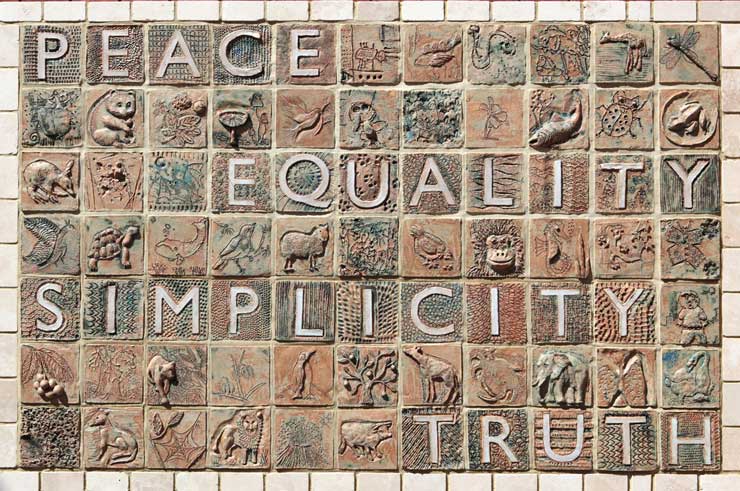|
Although Quakers have no formal creed or dogma, there are a number of Quaker Testimonies that are
important to most of us, and that most of us try to follow to a greater or lesser degree. The most
well-known of these are the testimonies on Simplicity, Peace, Integrity (or Truth), Community, Equality,
and Environment. A very brief summary of each is provided on this page; more information about the central ideas of each of these testimonies, and how they
have grown and developed through Friends' history and experience, is included under the link for each
in the left menu. You do not have to follow all of these Testimonies to consider yourself a Friend.
They are quite challenging to live out, and for many of us, putting them into
practice is more a goal that we strive to keep in mind, than something that
we believe we achieve regularly.
None of the testimonies has fixed wording, so that all are open
to personal interpretation. Friends believe that "the letter killeth, but the spirit giveth life."
However, there was a letter written by early Friends to the King of England that is often quoted as
the Peace Testimony.
Simplicity: Friends strive for "simple living." This means avoiding excessive luxury in our
lives. One reason for this is that luxuries can act as a cushion or barrier between us and other people.
Peace: Friends try to live our lives according to pacifist principles. This does not mean
that we are passive in the face of injustice, but that we strive to resolve conflict without the
use of violence. Traditionally, Friends have been Conscientious Objectors during times of war.
This is probably the testimony for which we are best known.
Integrity (or Truth): Friends think that it is very important to behave at all times
with truth and integrity. From the days of early Quakers, the truth has been considered a sacred
obligation. This carries beyond the way we speak, to the way we live our lives.
Community: This testimony is often considered to be very closely related to the testimony of equality. However,
it also acknowledges that if we all commit to a common goal, we can do things together that no one
could accomplish alone. It forms one basis for the Friends' practice of requiring unity (consensus) in all
decision-making.
Equality: From the earliest days, Friends' belief that there is "that of God" in everyone has
led us to the inescapable conclusion that all people are equally important, and anyone may have
equally valuable contributions to make.
Environment: Testimonies can change and evolve over time, and this is a relatively new one.
Most Friends are deeply concerned
over the condition of the earth, and try to live our lives so as to minimise our own contribution to
the harm that continues to be done.
|
|

